新视野大学英语1教案参模板unit1(第3、4学时)
新视野大学英语第二版第三册unit 1教案

Practice:
1.一位有经验的工程师负责这项工程。
An experienced engineer isin charge ofthis project.
2.你不在时,要我帮你处理业务吗?
Shall I deal with your business whileyou are gone?
The sunshine could not penetrate where the trees were thickest.
她戴了一顶假发,但是我们很快就识穿了她的伪装。
She has a wig on, but we soon penetrate her disguise.
6.graspv. tounderstand; to take hold of sb. or sth.
The thief wore a false beard and glasses as a disguise.
那贼乔装打扮带上了假胡须和眼镜。
这位妇女强作欢笑以掩饰内心的悲伤。
The woman tried to disguise her sadness in cheerfulness.
5.penetratev.toenter sth. or pass through it; to see into or through sth.
Part I (Para.1~_3):All family members took good care of Jimmy.
Part II (Paras.4~7):I looked after Jimmy alone after parents’ death.
Part III (Paras.8~9):Jimmy’s 57th birthday was a success.
新视野大学英语第三版教案unit1课件
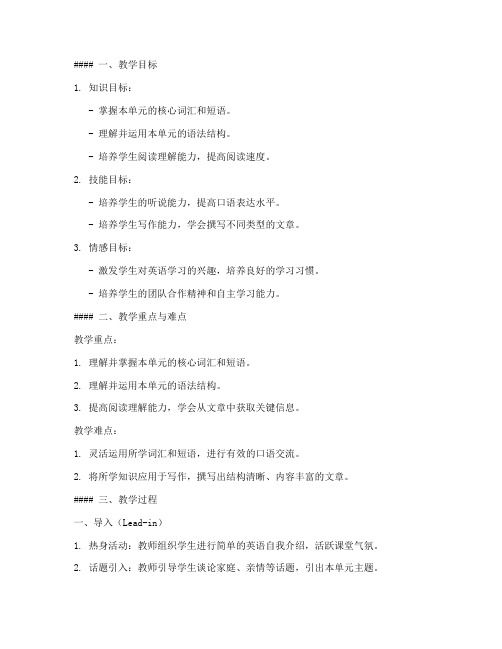
#### 一、教学目标1. 知识目标:- 掌握本单元的核心词汇和短语。
- 理解并运用本单元的语法结构。
- 培养学生阅读理解能力,提高阅读速度。
2. 技能目标:- 培养学生的听说能力,提高口语表达水平。
- 培养学生写作能力,学会撰写不同类型的文章。
3. 情感目标:- 激发学生对英语学习的兴趣,培养良好的学习习惯。
- 培养学生的团队合作精神和自主学习能力。
#### 二、教学重点与难点教学重点:1. 理解并掌握本单元的核心词汇和短语。
2. 理解并运用本单元的语法结构。
3. 提高阅读理解能力,学会从文章中获取关键信息。
教学难点:1. 灵活运用所学词汇和短语,进行有效的口语交流。
2. 将所学知识应用于写作,撰写出结构清晰、内容丰富的文章。
#### 三、教学过程一、导入(Lead-in)1. 热身活动:教师组织学生进行简单的英语自我介绍,活跃课堂气氛。
2. 话题引入:教师引导学生谈论家庭、亲情等话题,引出本单元主题。
二、课文讲解(Text Explanation)1. 词汇讲解:教师讲解本单元的核心词汇和短语,并举例说明其用法。
2. 语法讲解:教师讲解本单元的语法结构,并举例说明其在课文中的应用。
3. 阅读理解:教师带领学生阅读课文,分析文章结构,提炼关键信息。
三、口语练习(Oral Practice)1. 小组讨论:学生分组讨论课文内容,分享自己的观点和感受。
2. 角色扮演:学生分组进行角色扮演,模拟课文中的场景,提高口语表达能力。
四、写作练习(Writing Practice)1. 写作指导:教师指导学生如何撰写文章,包括文章结构、写作技巧等。
2. 范文展示:教师展示优秀范文,供学生参考。
3. 学生写作:学生根据所学知识,撰写短文。
五、课堂小结(Summary)1. 回顾所学内容:教师引导学生回顾本节课所学知识,巩固所学内容。
2. 布置作业:教师布置相关作业,帮助学生巩固所学知识。
#### 四、教学资源1. 教材:《新视野大学英语第三版》2. 辅助材料:多媒体课件、词汇卡片、语法练习册等3. 网络资源:在线词典、英语学习网站等#### 五、教学反思本节课通过多种教学手段,帮助学生掌握了本单元的核心词汇、语法结构和阅读技巧。
大学英语第一课教案
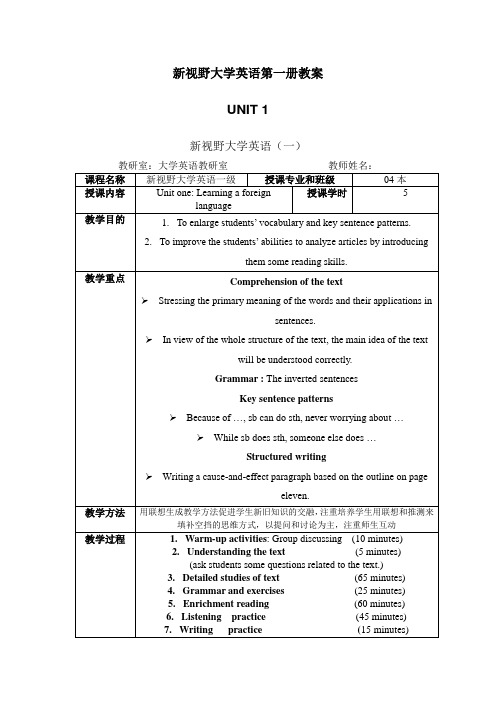
1.Vocabulary
2.Structure
3.Translation
Enrichment reading:
Elicit questions from the students, practice fast reading skills, focus on difficult sentences and cultural notes and improves students’ self-learning abilities.
Step 2:Ask the representatives of 2 or 3 groups to report the result of their discussion to the class.
2).Class discussion:
Summarize the answers to these questions.
6.Virtual:almost what is stated; made up
e.g The king was so much under the control of his wife that she was the
virtual leader of the country.
mitment:a promise to follow certain beliefs or certain course of actions
e.g Far from angry, he’s very happy.
e.g Her husband is far from handsome, he’s very ugly.
新视野大学英语第三版教案unit1
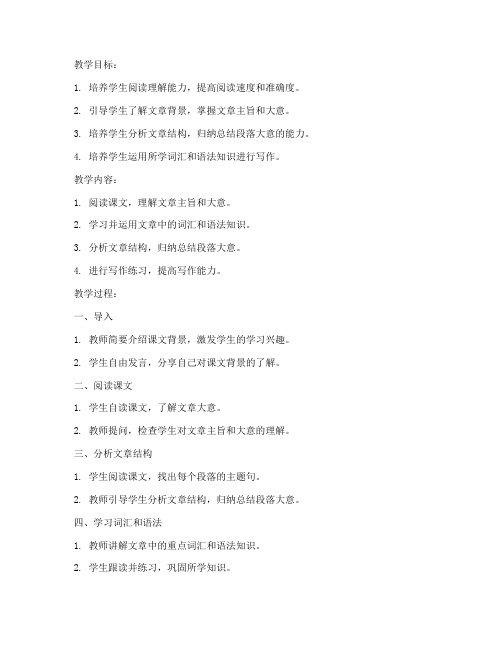
教学目标:1. 培养学生阅读理解能力,提高阅读速度和准确度。
2. 引导学生了解文章背景,掌握文章主旨和大意。
3. 培养学生分析文章结构,归纳总结段落大意的能力。
4. 培养学生运用所学词汇和语法知识进行写作。
教学内容:1. 阅读课文,理解文章主旨和大意。
2. 学习并运用文章中的词汇和语法知识。
3. 分析文章结构,归纳总结段落大意。
4. 进行写作练习,提高写作能力。
教学过程:一、导入1. 教师简要介绍课文背景,激发学生的学习兴趣。
2. 学生自由发言,分享自己对课文背景的了解。
二、阅读课文1. 学生自读课文,了解文章大意。
2. 教师提问,检查学生对文章主旨和大意的理解。
三、分析文章结构1. 学生阅读课文,找出每个段落的主题句。
2. 教师引导学生分析文章结构,归纳总结段落大意。
四、学习词汇和语法1. 教师讲解文章中的重点词汇和语法知识。
2. 学生跟读并练习,巩固所学知识。
五、写作练习1. 教师给出写作题目,要求学生运用所学知识进行写作。
2. 学生独立完成写作,教师巡视指导。
六、课堂小结1. 教师总结本节课所学内容,强调重点和难点。
2. 学生回顾所学知识,提出疑问。
七、课后作业1. 复习课文,掌握文章主旨和大意。
2. 预习下一课,为下一节课做好准备。
教学评价:1. 课堂表现:观察学生在课堂上的发言、互动情况,评价其学习态度和参与度。
2. 阅读理解:通过提问、讨论等方式,评价学生对文章主旨和大意的理解程度。
3. 词汇和语法:通过学生的跟读、练习,评价其对词汇和语法知识的掌握程度。
4. 写作能力:通过学生的写作练习,评价其写作能力。
教学反思:1. 本节课是否达到了教学目标?2. 学生在课堂上的表现如何?3. 教学方法是否合适?4. 如何改进教学效果?备注:1. 教师应根据学生的实际情况调整教学内容和进度。
2. 注重培养学生的阅读兴趣和自主学习能力。
3. 鼓励学生积极参与课堂活动,提高课堂氛围。
新视野大学英语1unit1教案
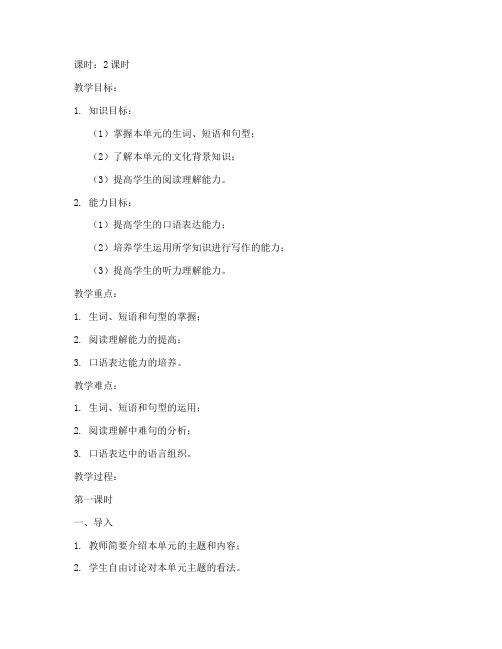
课时:2课时教学目标:1. 知识目标:(1)掌握本单元的生词、短语和句型;(2)了解本单元的文化背景知识;(3)提高学生的阅读理解能力。
2. 能力目标:(1)提高学生的口语表达能力;(2)培养学生运用所学知识进行写作的能力;(3)提高学生的听力理解能力。
教学重点:1. 生词、短语和句型的掌握;2. 阅读理解能力的提高;3. 口语表达能力的培养。
教学难点:1. 生词、短语和句型的运用;2. 阅读理解中难句的分析;3. 口语表达中的语言组织。
教学过程:第一课时一、导入1. 教师简要介绍本单元的主题和内容;2. 学生自由讨论对本单元主题的看法。
二、生词、短语和句型教学1. 教师带领学生逐一学习本单元的生词、短语和句型;2. 学生跟读、默写,巩固记忆;3. 教师讲解重点词汇、短语和句型的用法。
三、课文阅读1. 学生自读课文,理解大意;2. 教师引导学生分析课文中的难句,讲解语法知识;3. 学生朗读课文,巩固语音、语调。
四、课堂活动1. 教师组织学生进行小组讨论,分析课文中的文化背景知识;2. 学生分享自己的观点,提高口语表达能力。
第二课时一、复习1. 教师带领学生复习上一节课的生词、短语和句型;2. 学生跟读、默写,巩固记忆。
二、阅读理解1. 学生自读课文,完成阅读理解练习;2. 教师讲解阅读理解中的难题,分析解题技巧;3. 学生分享自己的阅读心得。
三、口语表达1. 教师组织学生进行角色扮演,模拟课文中的场景;2. 学生运用所学知识进行口语表达,提高语言组织能力。
四、写作1. 教师讲解写作技巧,指导学生完成写作任务;2. 学生运用所学知识进行写作,提高写作能力。
五、课堂小结1. 教师对本节课的学习内容进行总结;2. 学生分享自己的学习心得。
教学评价:1. 学生对生词、短语和句型的掌握程度;2. 学生在阅读理解、口语表达和写作方面的进步;3. 学生对课堂活动的参与度和积极性。
新视野大学英语第一册unit1learning a foreign language讲课教案

Back
Learning a Foreign Language
Part One General
Part Two Specific
Part Three General
Para. 8: The rewarding of English learning
Paras. 2-7: The author tells his experiences with the regular 1c)outrhsePevaairnluame. 1oif.dhLdalereadrswcnohirnokgolas afonrdeiagtncloalnleggueaagsewwealsl aosnewoitfhththee 2o)nliinnsmeigchootssutirndstioeff.oitchuelrtcyuelttumresost rewarding experiences of my 3T) hinsewlpifawer.atyissoafbseoeuintgtthheinsgps;ecific difficulties of English learning 4) theTahbiislitpyatrotbtreidllgseuthseagbaopubtettwheeengednifeferraelnitdceualtuorfest.he whole 5) Copnaclsussaiogne:.Learning English is difficult yet rewarding.
导入
预习
小结
写作
Back
Main Idea of the Text
Learning a foreign language was one of
the most ____d_i_ff_ic_uylett most __re_w__a_r_d_in_g_experiences of my life.
新视野大学英语1教案参模板unit(第1、2学时)
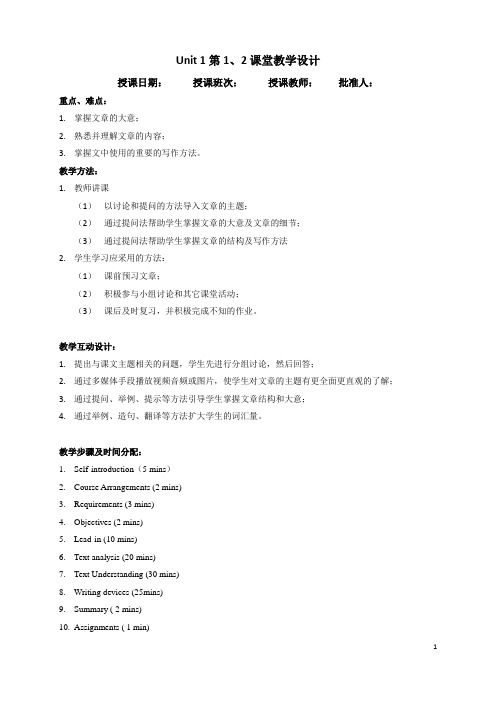
U nit 1第1、2课堂教学设计
授课日期:授课班次:授课教师:批准人:
重点、难点:
1.掌握文章的大意;
2.熟悉并理解文章的内容;
3.掌握文中使用的重要的写作方法。
教学方法:
1.教师讲课
(1)以讨论和提问的方法导入文章的主题;
(2)通过提问法帮助学生掌握文章的大意及文章的细节;
(3)通过提问法帮助学生掌握文章的结构及写作方法
2.学生学习应采用的方法:
(1)课前预习文章;
(2)积极参与小组讨论和其它课堂活动;
(3)课后及时复习,并积极完成不知的作业。
教学互动设计:
1.提出与课文主题相关的问题,学生先进行分组讨论,然后回答;
2.通过多媒体手段播放视频音频或图片,使学生对文章的主题有更全面更直观的了解;
3.通过提问、举例、提示等方法引导学生掌握文章结构和大意;
4.通过举例、造句、翻译等方法扩大学生的词汇量。
教学步骤及时间分配:
1.Self-introduction(5 mins)
2.Course Arrangements (2 mins)
3.Requirements (3 mins)
4.Objectives (2 mins)
5.Lead-in (10 mins)
6.Text analysis (20 mins)
7.Text Understanding (30 mins)
8.Writing devices (25mins)
9.Summary ( 2 mins)
10.Assignments ( 1 min)。
新视野大学英语读写教程1第三版Unit1

新视野大学英语读写教程1第三版Unit1Unit 1 Fresh StartSection APre-reading activities1.Which of the tips mentioned in the interview is most useful to you? Why?In fact all the pieces of advice mentioned in the interview are very useful. But if I have to choose one as the most useful, I'd choose "keep a balance". When we were in high school, we spent almost all our time studying. There lacked a balance between social life and academic life in high school. It's important to keep a balance between life and work because it will give us a sound mind in a sound body. Now we have much more free time, so we can join student organizations or go to different activities.2.What advice did your parents give you before you left for college?Before I left for college my parents did have a talk with me. They told me how important college experience would be in my life. They told me about the opportunities that college education would open up to me. They told me to try to develop more interests and join some student clubs. The most impressive advice they gave me was that I should not only read books about my major; instead, they advised me to read as widely as possible. All these are very valuable pieces of advice.Reading comprehension1.According to the president, what did the parents remind their children to dobefore they left for college?The parents reminded their children to work hard and achieve the best they could.2.What does the president call on the students to do with the greatest resourceson campus?The president calls on the students to make the most of the great resources on campus: to explore new subjects, to meet fascinating people, and to pursue new passions.3.What does the president mean when he says "sample them widely" (Para. 5)? By saying "sample them widely", the president means students should try many different courses and try something new to see what it is like.4.What could be the consequences if you don't challenge yourself?If we don't challenge ourselves, we will not become broadly educated people, and we may not find the passion that will help us shape our future.5.What can you learn from the example of Vera Wang?We can learn from the example of Vera Wang that we should challenge ourselves, and by challenging ourselves, we are more likely to find an interest we don't know we have, and this interest may help us build a prosperous future.6.How should you deal with new and unpleasant experiences in college?We should not worry, and we should learn to face this new part of our life with enthusiasm. College experiences, pleasant or unpleasant, will provide us with valuable lessons and will enrichour life.7.How do you understand "Now it is your turn" (Para. 7)?The expression "Now it is your turn" means that now it is time for you to acquire knowledge and to pass it on.8.How does the president's speech impress you?The president's welcoming speech is really impressive. He mentions many important things about college life, the resources available on campus, as well as the opportunities we have and the responsibilities that we should take. The speech is very inspiring.1. What role do you think a university education will play in your life?A university education will play a very important role in my life, and it will benefit me in a number of ways. In the university I can acquire specialized knowledge about my major, and develop my critical thinking and research skills.I will have the opportunities to meet and share ideas with people of different minds. I can gain a broader view of the world by meeting people from diverse backgrounds and cultures. And I will start my life journey of self-discovery, self-improvement, and self-fulfillment.2.Do you think a university education can change a person's life? In what wayand why?Yes, absolutely. With a university education, a person will have more freedom and therefore more choices. This education experience provides unlimited potential. Moreover, a university education provides the means for one to succeed. Not only will a person obtain knowledge and skills essential for his career development, but he will also develop an independent mind andbe able to make right decisions on his own.3.How do you think about those successful people such as Bill Gates who droppedout of university?I admire those who dropped out of university and yet had made fame for themselves by achieving big goals. Some people use those successful college dropouts as counterexamples to show their belief that a person can succeed even without a university education. Chances are that most people do not have the same mind, talent, determination, or opportunities as Bill Gates, Steve Jobs, and Mark Zuckerberg did; therefore, they might not be able to achieve success without having a university education. In fact, a university education will equip them with the necessary knowledge and skills which will help them to succeed.4.How do you understand the statement "If you think education is expensive,try ignorance"?Nowadays education is getting more and more expensive, especially college education. And there are people who choose to give up education because of the high cost. But without education, one would not be able to acquire knowledge that an education will offer. In other words, they would be "ignorant". The result would be that "ignorant" people will suffer even more or pay even more for being so. It is true that education is expensive, but if you try "ignorance", the cost would be even higher.5.What are you going to do at university in order to sample widely and challengeyourself?To sample widely and challenge myself, I am going to ventureout of my comfort zone and do what I have not had the courage to do. For instance, I will make friends with people from diverse backgrounds and cultures. I will take a swimming class and learn how to swim. I will attend lectures, join student clubs, and try all kinds of food. Most of all, I will do whatever it takes to make the most of the four years and try to become a well-rounded graduate.Words in use1. Given the chance to show his ability, he regained (confidence) and began to succeed in school.2. It is so difficult to (explore) the bottom of the ocean because some parts are very deep.3. It was about 30 seconds before Alex (emerged) from the water; we were quite scared.4. We often (assume) that when other people do the same things as we do, they do them for the same reasons; but this assumption is not always reasonable.5. There is widespread concern that the rising unemployment may (pose) a threat to social stability.6. After a(n) (comprehensive)physical exam, my doctor said I was in good condition except that my blood pressure was a little high.7. It is well known that China is a country with rich natural (resources) and a very big population.8. Some people believe that the earth can (yield) enough food to support at least twice its present population.9. Sam (inherited) the gift of imagination from his family, but he lacked the driving power to take action.10. A bee that has found honey is able to (transmit) to other bees the information they need in order to collect the honey.Word building: Practiceun-cover ? 1)(uncover)easy ? 2)(uneasy)load ? 3)(unload)-antapply ? 4)(applicant)resist ? 5)(resistant)account ? 6)(accountant)assistant ? 7)(assist)-ifysimple ? 8)(simplify)note ? 9)(notify)quality ? 10)(qualify)class ? 11)(classify)1. Despite being (classified)as a meat-eater, the panda has a diet that is overwhelmingly vegetarian.2. They have developed computerized systems which will greatly (assist)all library users so that they will not need the help of others.3. Changes have been made to the construction requirements in this city in order to make the buildings and highways more (resistant) to earthquakes.4. After a two-month inquiry, the police have (uncovered)the three men's intention to rob a bank and have arrested them.5. Consumers say they are (uneasy)about using their credit cards over the Internet because they are afraid of Internet fraud (欺诈) and identity theft.6. A college degree and some working experience should (qualify) you for the job advertised in the newspaper.7. The British ship arrived at the port this morning and is (unloading)its contents in the harbor now.8. As a human resources manager, I see many job (applicants) who are technically skilled, but have bad attitudes.9. The teacher (simplified) his instructions so that the small children could understand him better.10. My major was literature. However, now I'm working in a firm as a(n) (accountant), dealing with numbers every day.11. The committee's decision will be (notified) to all employees next week.Banked clozeUniversity students come from different parts of the country with various purposes. However, a closer look at their reasons for studying at the university will enable us to 1)(classify) them roughly into three groups: those who have a(n) 2)(passion) for learning, those who wish to 3)(attain) a bright future, and those who learn with no definite purpose.Firstly, there are many students who learn simply because they 4)(pursue) their goal of learning. Some read a wealth of British and American novels because they are keenly interested in literature. Others sit in front of the computer screen, working on a new program, 5)(virtually) day and night, because they find some computer programs 6)(fascinating), and they dream of becoming a "Bill Gates" one day.Secondly, there are students who work hard mainly for a better and more 7)(prosperous)future. It seems that the majority of students fall into this group. After admission to the university, they read books after books to 8)(acquire) knowledge from all of the resources which are 9)(available) to them, and finally, to succeed in the future job market.Thirdly, there are still some students who learn without a clear goal. They take courses, finish homework, enjoy life on campus, but don't want to 10)(sample) anything new or challenging. They have no idea what they will be doing after college. And they may end up with nothing in their lives.Expressions in use1. My family 1)(got by) on my father's unemployment benefit after he lost his job.2. Many subway riders read books or listen to music in order to 2)(make the most of) their time on the way to work.3. In order to make sure he would be able to attend the meeting, I called him up two weeks 3)(in advance).4. Experts say our company is amazing in that sales have been increasing steadily4)(over time).5. In order to 5)(reap the benefits of)the physical exercise, you have to exercise regularly, and for at least half an hour each time.6. They all tried to talk 6)(all at once), but I couldn't hear anything they said.7. Yellow flowers in the field always 7)(remind) me 8)(of) my childhood in the countryside.8. We have been practicing for so long and so hard that our team should 9)(standa chance of) winning the game.9. Research on genes will 10)(open the door to) exciting new medical treatments.10. Every one of you has made a contribution and I 11)(take pleasure in) acknowledging what each of you has done to make this academic convention such a success.Structure analysis: PracticeA B B CStructured writing: PracticeThere are some things you can do to succeed in college. First, pursue passions. Your passions will broaden your mind and make your life interesting. Second,never let go of any opportunities that come your way. College is full of unique opportunities, which will enable you to sample new things and meet wonderful people. Lastly, take responsibilities. In college you must learn to be responsible for your own decisions and actions. With the passions, the opportunities, and the ability to take responsibilities, you will become successful not only in college, but also in your future career.Translation苏格拉底是古希腊哲学家,被誉为现代西方哲学的奠基人。
- 1、下载文档前请自行甄别文档内容的完整性,平台不提供额外的编辑、内容补充、找答案等附加服务。
- 2、"仅部分预览"的文档,不可在线预览部分如存在完整性等问题,可反馈申请退款(可完整预览的文档不适用该条件!)。
- 3、如文档侵犯您的权益,请联系客服反馈,我们会尽快为您处理(人工客服工作时间:9:00-18:30)。
Unit I第3、4学时课堂教学设计
授课日期:授课班次:授课教师:批准人:重点、难点
1. 掌握语法:现在分词短语和倒装
2. 掌握文中使用的重要的写作方法,如:因果法
3. 掌握重点词汇短语和句型
教学方法
1. 教师讲课拟采用的方法
(1)以提问的方法复习文章的主题及写作方法
(2)通过举例法、造句法等帮助学生掌握文章重点短语
(3)通过模仿帮助学生掌握重点句型
2. 学生学习应采用的方法
(1)课前预习文章的新词
(2)积极参与小组讨论和其它课堂活动
(3)课后及时复习,并积极完成布置的作业
教学互动设计
1. 提出与课文内容相关的问题,学生先进行小组讨论,然后回答
2. 功过提问、举例、提示等方法引导学生进一步理解课文
3. 通过举例、造句、翻译等方法扩大学生的词汇和掌握重点句型
4. 通过讨论的方法集体练习写作
教学步骤及时间分配
1. Oral report (5 mins)
2. Review (5 mins)
3. Objectives (1 min)
4. Background Information (3 mins)
4. Language points (46 mins)
5. Sentence patterns (20 mins)
6. Writing (20 mins)
7. Summary (3 mins)
8. Assignments (2 mins)。
